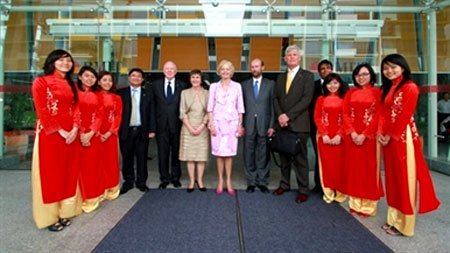
|
The Vietnam Ministry of Education and Training (MOET) has given priority to strengthening international cooperation in education, especially at tertiary levels. Local universities are encouraged to coordinate with foreign partners to develop new training programs with more subjects delivered in English as in foreign universities using teachers with MA or PHD qualifications.
Many Vietnamese universities have successfully set up links with international counterparts to improve their training programs.
The Hanoi University of Business and Technology, for example, has cooperated with several universities from the UK, US, France, Germany, Switzerland, Canada and Singapore to run new courses for local students.
Prof. Tran Phuong, Rector at the Hanoi University of Business and Technology, says the new courses help students broaden their knowledge and study foreign languages in a more effective way, which will make it easier for them to find jobs and earn a living after graduation. However, he says, how to apply international training standards to Vietnam’s education sector in the face of poor infrastructure coupled with shortage of experienced lecturers is another matter.
Dr. Vu Minh Gang, Vice Rector of the Hanoi-based National University, says it requires greater efforts in the field of international education cooperation before his university can become one of the top 200 in the world.
A recent investigation showed some universities simply cooperated with foreign partners to recruit students for their vocational training programs without the MOET’s approval but they often failed to meet the minimum standards required for classrooms, teaching facilities, qualified lecturers and class managers.
In certain cases, Giang cites, they cared too much about making a profit and only accepted those students who can pay higher fees for the new courses to get a certificate from a foreign university.
Mark A.Ashwill, former Director of the Institute of International Education (IIE) in Vietnam, says there is no denying the ineffective cooperation between some Vietnamese universities and their foreign partners. This is, in part, due to the MOET’s decision to allow local universities to choose partners and develop new training programs on their own.
Despite their agreement with foreign partners on the need to ensure the quality of training programs, students are still those who will have to suffer most from paying more but getting less than what they wish for.
VietNamNet/VOV online